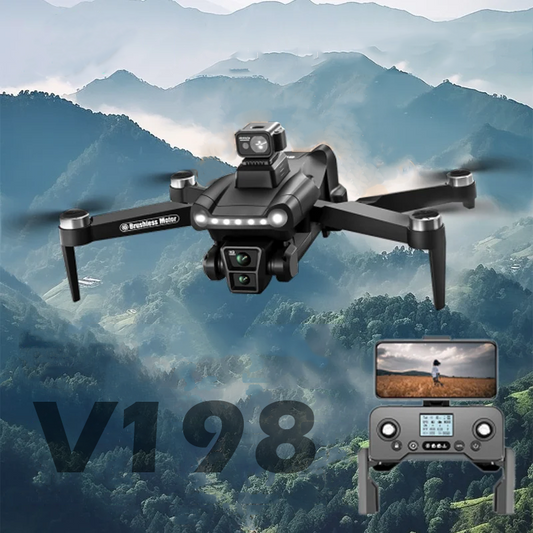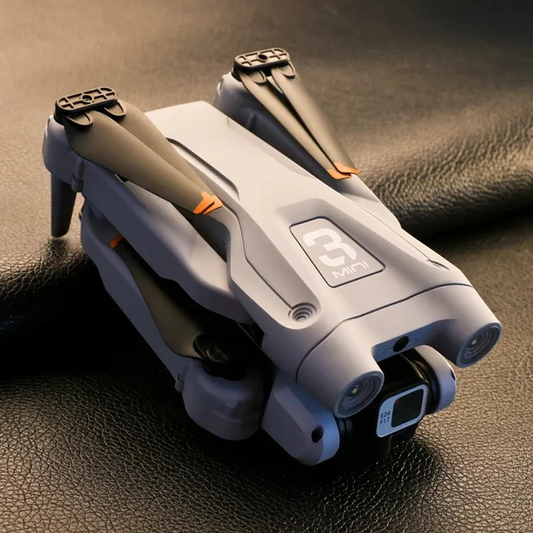Advancements in AI-Powered Drone Technology

In the realm of technology, few innovations have captivated our imaginations as profoundly as the integration of Artificial Intelligence (AI) with drone technology. These unmanned aerial vehicles have undergone a remarkable transformation, evolving from simple remote-controlled devices to sophisticated AI-powered marvels that are reshaping industries and pushing the boundaries of what was once thought possible. In this article, we'll explore the cutting-edge advancements in AI-powered drone technology that are propelling us into a new era of aerial capabilities.
The Rise of AI in Drone Technology

Over the past decade, the marriage of AI and drone technology has given birth to a new generation of unmanned aerial vehicles that are smarter, more efficient, and versatile than ever before. AI algorithms, powered by machine learning and deep learning models, have enabled drones to perform complex tasks autonomously, revolutionising industries such as agriculture, surveillance, logistics, and more.
1.Precision Agriculture

One of the most impactful applications of AI-powered drones is in agriculture. These aerial marvels equipped with advanced sensors and cameras can analyse crop health, identify diseases, and optimise irrigation. AI algorithms process vast amounts of data collected from the drone's sensors, providing farmers with real-time insights that empower them to make data-driven decisions. This not only increases crop yield but also reduces the need for excessive pesticide and water usage, contributing to sustainable and efficient farming practices.
2.Surveillance and Security

AI-powered drones have become invaluable tools in the realm of surveillance and security. Equipped with facial recognition technology and object detection algorithms, these drones can autonomously monitor large areas, identify potential threats, and send alerts in real-time. This capability enhances the effectiveness of security systems, whether deployed for public safety, border control, or private property monitoring. The ability to cover expansive areas efficiently makes AI-powered drones an indispensable asset in ensuring the safety and security of diverse environments.
3.Logistics and Delivery

The logistics industry has experienced a paradigm shift with the integration of AI-powered drones. Major players in e-commerce and delivery services are exploring the potential of using drones to streamline and expedite their delivery processes. AI algorithms enable drones to navigate complex environments, avoid obstacles, and optimise delivery routes. This not only reduces delivery times but also lowers operational costs, making it a win-win for businesses and consumers alike.
Recent Breakthroughs in AI-Powered Drone Technology

As technology continues to evolve at an unprecedented pace, recent breakthroughs in AI-powered drone technology are propelling these unmanned aerial vehicles to new heights, both figuratively and literally.
1.Edge Computing for Real-time Processing
Traditionally, drones relied on sending data to a centralised server for processing, which could introduce delays in decision-making. However, recent advancements have seen the integration of edge computing in drone technology. This means that data is processed locally on the drone itself, allowing for real-time analysis and decision-making. This is particularly crucial in applications such as search and rescue operations, where split-second decisions can make a significant impact.
2.Swarm Intelligence
Inspired by the collaborative behaviour of social insects, swarm intelligence in AI-powered drones involves multiple drones working together in a coordinated manner. This breakthrough enables drones to share information, optimise task allocation, and operate as a unified system. Swarm intelligence is particularly beneficial in scenarios where a collective effort is required, such as disaster response, environmental monitoring, or large-scale infrastructure inspections.
3.Advanced Sensing Technologies
The sensory capabilities of AI-powered drones have undergone substantial enhancements. Drones are now equipped with state-of-the-art sensors, including LiDAR (Light Detection and Ranging), multispectral cameras, and thermal imaging. These sensors enable drones to gather highly detailed and accurate data, expanding their capabilities in tasks such as mapping, environmental monitoring, and infrastructure inspection. The integration of advanced sensing technologies also ensures that drones can operate effectively in diverse and challenging environments.
Future Prospects and Challenges

While the advancements in AI-powered drone technology are undeniably impressive, the journey doesn't end here. The future holds even more exciting possibilities as researchers and engineers continue to push the boundaries of what AI and drones can achieve together.
1.Artificial Intelligence and Autonomous Decision-Making
The evolution of AI in drone technology is moving towards greater autonomy and intelligent decision-making. Researchers are exploring ways to enhance the cognitive abilities of drones, allowing them to adapt to dynamic environments, learn from experience, and make complex decisions without human intervention. This shift towards autonomy opens up possibilities for applications in areas such as disaster response, where quick and adaptive decision-making is critical.
2.Regulatory and Ethical Considerations
As AI-powered drones become more prevalent, addressing regulatory and ethical considerations becomes paramount. Striking a balance between innovation and responsible deployment is crucial to ensure the safe and ethical use of this technology. Regulatory frameworks need to evolve to keep pace with technological advancements, addressing issues such as privacy concerns, airspace management, and the potential misuse of AI-powered drones.
3.Collaboration and Interconnected Systems
The future landscape of AI-powered drone technology is likely to involve increased collaboration and interconnected systems. Drones could work in tandem with other emerging technologies such as 5G networks, Internet of Things (IoT) devices, and cloud computing to create a seamlessly connected ecosystem. This interconnectedness could further enhance the capabilities of AI-powered drones and open up new avenues for innovation in various industries.
In conclusion, the advancements in AI-powered drone technology represent a transformative era in the world of unmanned aerial vehicles. From precision agriculture to surveillance, logistics, and beyond, these intelligent machines are reshaping industries and pushing the boundaries of what was once thought possible. The recent breakthroughs in edge computing, swarm intelligence, and advanced sensing technologies are propelling drones to new heights, both in terms of capability and application.
As we look to the future, the prospects of even greater autonomy, collaboration, and interconnected systems are on the horizon. However, along with these exciting possibilities come the challenges of navigating regulatory landscapes and addressing ethical considerations. Striking the right balance between innovation and responsibility will be key to unlocking the full potential of AI-powered drone technology and ensuring a future where these intelligent machines contribute positively to society.
Explore a variety of drones at our online drone store.
Happy Flying!









